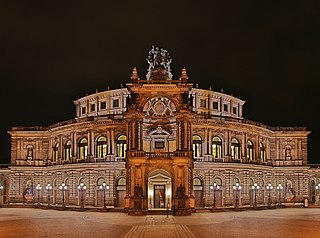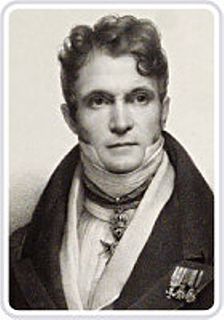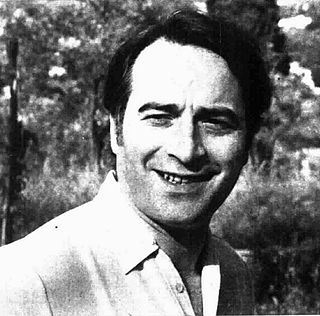
La Scala is an opera house in Milan, Italy. The theatre was inaugurated on 3 August 1778 and was originally known as the Nuovo Regio Ducale Teatro alla Scala. The premiere performance was Antonio Salieri's Europa riconosciuta.
Kapellmeister is a German word designating a person in charge of music-making. The word is a compound, consisting of the roots Kapelle and Meister ("master"). Originally used to refer to somebody in charge of music in a chapel, the term has evolved considerably in its meaning in response to changes in the musical profession.

The Staatskapelle Dresden is a German orchestra based in Dresden, the capital of Saxony. Founded in 1548 by Maurice, Elector of Saxony, it is one of the world's oldest and most highly regarded orchestras. Its precursor ensemble was Die Kurfürstlich-Sächsische und Königlich-Polnische Kapelle. The orchestra is the musical body of the Staatsoper Dresden. The venue of the orchestra is the Semperoper.

Antônio Carlos Gomes was the first New World composer whose work was accepted by Europe. The only non-European who was successful as an opera composer in Italy, during the "golden age of opera", contemporary to Verdi and Puccini and the first composer of non-European lineage to be accepted into the Classic tradition of music.
This article is about music-related events in 1825.

Gaspare Luigi Pacifico Spontini was an Italian opera composer and conductor.

Federico Maria Sardelli is an Italian conductor, historicist, composer, musicologist, and flautist. He founded the medieval ensemble Modo Antiquo in 1984. In 1987, Modo Antiquo also became a baroque orchestra, debuting with the performance of Jean-Baptiste Lully's Ballet des Saisons in front of an audience of about five thousand.

The N. A. Rimsky-Korsakov Saint Petersburg State Conservatory is a school of music in Saint Petersburg, Russia. In 2004, the conservatory had around 275 faculty members and 1,400 students.

The Teatro Reale di San Carlo, as originally named by the Bourbon monarchy but today known simply as the Teatro di San Carlo, is an opera house in Naples, Italy, connected to the Royal Palace and adjacent to the Piazza del Plebiscito. It is the oldest continuously active venue for opera in the world, having opened in 1737, decades before either Milan's La Scala or Venice's La Fenice.

Cecilia Bartoli, Cavaliere OMRI is an Italian coloratura mezzo-soprano opera singer and recitalist. She is best known for her interpretations of the music of Bellini, Mozart and Rossini, as well as for her performances of lesser-known music from the Baroque and Classical period. She is known for having the versatility to sing both soprano and mezzo roles.
The BBC Concert Orchestra is a British orchestra based in London, one of the British Broadcasting Corporation's five radio orchestras. With around fifty players, it is the only one of the five BBC orchestras which is not a full-scale symphony orchestra. The BBC Concert Orchestra is the BBC's most populist ensemble, playing a mixture of classical music, light music and popular numbers. Its primary role is to produce music for radio broadcast, and it is the resident orchestra of the world's longest running live music programme, Friday Night is Music Night on BBC Radio 2.

Giove in Argo is an Italian opera by George Frideric Handel. It is one of Handel's three pasticcio works made up of music and arias from his previous operas. The libretto was written by Antonio Maria Lucchini. The opera was first performed at the King's Theatre, Haymarket, London, on 1 May 1739.

Tito Manlio is an opera in three acts by Antonio Vivaldi, to a libretto by Matteo Noris. It was written in celebration of the marriage of Philip of Hesse-Darmstadt (1671–1736), the governor of Mantua, which he had announced at Christmas. Vivaldi quickly composed the opera within five days. Whereas the wedding eventually did not take place at all, the opera was successfully premiered at the Teatro Arciducale ‘detto il Comico’ in Mantua during the carnival season of 1719.
Luigi Ricci (1893–1981) was an Italian assistant conductor, accompanist, vocal coach, and author.

The Conservatorio Nacional de Música is a music conservatory located in the Polanco neighborhood of Mexico City, Federal District, Mexico.

Bruno Bartoletti was an Italian operatic conductor. His active international career lasted from 1953 to 2007, and he specialized in the Italian repertory and contemporary works. He was particularly noted for his 51-year association with Lyric Opera of Chicago, as co-artistic director, artistic director, principal conductor, and artistic director emeritus. He also served as Artistic Director of both the Teatro dell'Opera di Roma (1965–1973) and the Maggio Musicale Fiorentino (1985–1991), and as principal conductor of the Danish Royal Opera (1957–1960), in addition to frequent work as a guest conductor at various major opera houses.

Marco Betta is an Italian composer.












